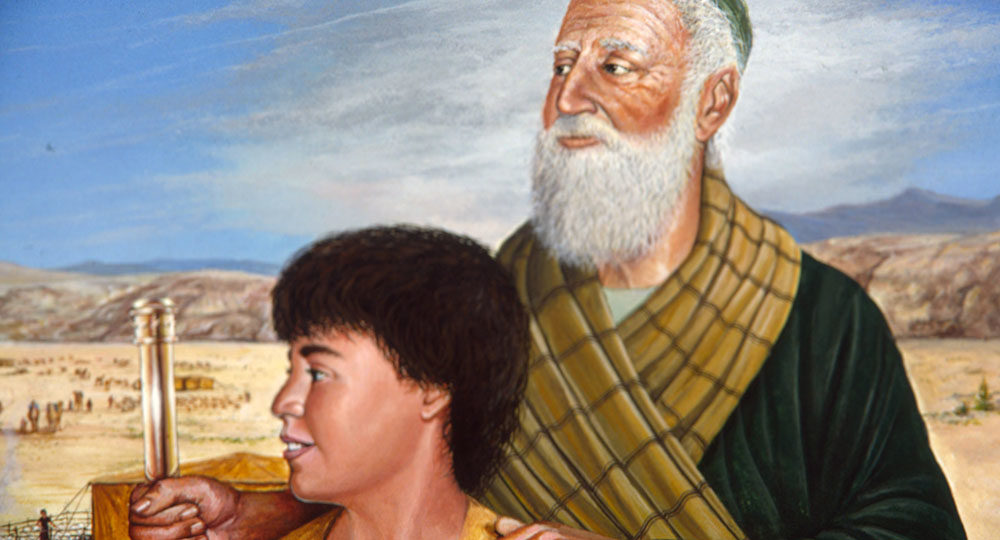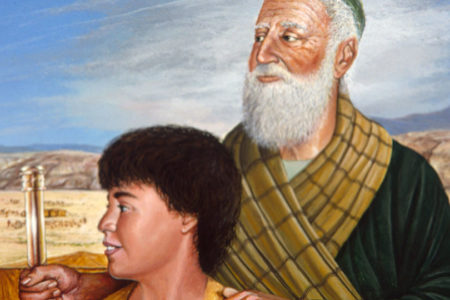Abraham: The Man Blessed by God
Genesis 12:2
A promise is only as good as the one who makes it. We have all had promises made to us that we knew would never be fulfilled. Conversely, other promises have been made that we were certain would be carried out.
The patriarch Abraham was given promises by the one who could never fail. Recorded in Genesis 12:2 are four distinct pledges made by God to him. As we examine these promises, their implications and fulfillments, I trust that they will be a blessing to you.
Promise Number One: “I Will Make of Thee a Great Nation”
To a childless bedouin who often moved from place to place to find grazing land and water for his flocks, this must have seemed like a farfetched notion. Was it possible that God would make of him a great nation?
In order for God’s promise to be fulfilled, this lone man must have a seed, a line. Of necessity, this seed would have to greatly multiply. Although Abraham was well-advanced in years and still childless, God reiterated this promise to His servant, and His plan began to unfold. “And I will make thy seed as the dust of the earth, so that if a man can number the dust of the earth, then shall thy seed also be numbered” (Gen. 13:16). Over and over promises were given of a seed to come through this son of Terah (Gen. 15:5; 17:2).
In Genesis 18:18 the Lord took His revelation a step further by stating, “Abraham shall surely become a great and mighty nation.” Finally the son of promise, Isaac, was born, and God’s promise to Abraham was also given to him: “in Isaac shall thy seed be called” (Gen. 21:12). This became a key element in God’s pledge, since Abraham became the father of several nations. It was necessary, therefore, that the divine promise be narrowed to the seed of one of his sons, Isaac. Thus, the promised nation would not include all of Abraham’s lineage. God later narrowed the promise further to a people who would come through the line of Jacob, one of Isaac’s sons.
Centuries later, Balaam, a false prophet, said, “Who can count the dust of Jacob, and the number of the fourth part of Israel” (Num. 23:10). Still later, Moses said, “Thy fathers went down into Egypt with threescore and ten persons, and now the LORD thy God hath made thee as the stars of heaven for multitude” (Dt. 10:22).
From Abraham came the great nation which the Lord promised. Amazingly, that nation, Israel, still exists today, despite trouble, persecution, pogroms, and the Holocaust of World War II. Our God always keeps His promises.
Promise Number Two: “I Will Bless Thee”
What does it mean to be blessed? It can mean different things to different people. To a childless woman, it means having a baby. To a poverty-stricken person, it might mean having wealth. To a power-oriented person, it could mean having position or prestige.
Webster defines a blessed person as one who is happy, successful, or prosperous in temporal things. To bless someone is to wish him happiness. To be blessed can also mean to be joyful or blissful. J. Barton Payne, in his book Encyclopedia of Biblical Prophecy, quotes H. C. Leupold, “A man is blessed when due to the gracious working of God all goes well with him; the things that he undertakes thrive; and true success crowns all his endeavors.”1
A good illustration of God’s blessing is found in the life of Joseph.
And it came to pass from the time that he [Potiphar] had made him [Joseph] overseer in his house, and over all that he had, that the Lᴏʀᴅ blessed the Egyptian’s house for Joseph’s sake; and the blessing of the Lᴏʀᴅ was upon all that he had in the house, and in the field. … And Joseph was a handsome person, and well favored (Gen. 39:5–6).
This passage illustrates the Old Testament definition of blessing. God blessed Joseph in all that he did, and He also blessed those around Joseph because of him.
How did the Lord bless Abraham? He was blessed materially. Genesis 13:2 says, “Abram was very rich in cattle, in silver, and in gold.” He had all the wealth a man could desire. Lot, Abraham’s nephew, reaped the benefit of going to Canaan with his uncle, for he, too, had great wealth and possessions (Gen. 13:5). In fact, Abraham and Lot had to separate because the land was not able to sustain them, their substance was so great.
This is not an endorsement of “prosperity evangelism.” Financial blessing does not always follow when a person comes to the Lord. Often times of testing occur. Job is a case in point. He walked with the Lord, but he lost all his worldly possessions and his family. It is not recorded that Mary, the mother of Jesus, had much of this world’s goods. In fact, as He hung on the cross, Jesus instructed the beloved disciple John to care for her (Jn. 19:26–27). If wealth is the only form of blessing for a child of God, then Jesus Himself, while He was on the earth, was not blessed because He had nothing (Mt. 8:20).
Again, when Abraham returned victorious from a battle at the vale of Siddim, which is by the Dead Sea, “he brought back all the goods” (Gen. 14:16). Returning home after liberating his nephew Lot, Abraham met Melchizedek, King of Salem. When this “priest of the most high God” had brought forth bread and wine, he blessed Abraham (Gen. 14:18–19). This was a normal thing to do, but what he said next was not. Melchizedek said, “Blessed be Abram of the most high God, possessor of heaven and earth” (Gen. 14:19). The phrase “blessed be Abram” is important. The word blessed comes from the Hebrew word barak, which means to declare blessed. Many Jewish people today begin their prayers with the words “Barak Elumhem” (Blessed be God). Melchizedek declared that Abraham was blessed of God.
Another example of the fulfillment of God’s promise to Abraham is found in Genesis 24: “And Abraham was old, and well stricken in age: and the Lᴏʀᴅ had blessed Abraham in all things” (v. 1). The servant of Abraham, when obediently searching for a bride for Isaac, told Laban, “And the Lᴏʀᴅ hath blessed my master greatly: and he is become great: and he hath given him flocks, and herds, and silver, and gold, and menservants, and maidservants, and camels, and asses” (v. 35).
Again, it is clear that God kept His second promise to this patriarch of old. He was truly blessed.
Promise Number Three: “I Will Make Thy Name Great”
It is an honor to have a good name, one that is respected. A good reputation is worth more than silver or gold. A person can be either proud or ashamed to bear his family name.
Biblical names had great significance. A good example is found in the name of the person we are studying. God changed his name from Abram (father of high places) to Abraham (father of a multitude). God certainly made Abraham’s name great. His name is held in the highest esteem and is greatly respected by Jews, Muslims, and Christians alike. However, even this great honor pales in comparison with statements in the Scriptures concerning Abraham.
“Abimelech and Phicol, the chief captain of his host, spoke unto Abraham, saying, God is with thee in all that thou doest” (Gen. 21:22). The Lord had lifted up Abraham, thus making his name great.
When Sarah, Abraham’s wife, died at 127 years of age (Gen. 23:1), he needed a burial place for her. He asked the sons of Heth for permission to purchase a cave for that purpose. These inhabitants of the area of Hebron said, “Hear us, my lord: thou art a mighty prince among us” (Gen. 23:6). They offered him one of their choice sepulchers in which to bury his dead, and Abraham purchased the cave of Machpelah, which became the burying ground of the patriarchal family for many years. The point is clear: Abraham was considered “a mighty prince” by his neighbors. His name had been made great.
Promise Number Four: “Thou Shalt Be Blessing”
According to the Jewish writer Rashi the meaning of this verse is, “The power of blessing will be in your hand and you will bless whomever you wish, i.e., and you shall become the synonym of blessing.2
The New Testament Scriptures have much more to say about blessing. Paul, a Hebrew of Hebrews, wrote on this subject more than once. One illustration is in Galatians 3. Paul was writing to the Galatians about faith. They had turned back to keeping the Law after trusting Christ, and Paul reminded them that their salvation was by faith. Their walk then, should have been in the same manner. Paul used Abraham as his example. “Abraham believed God, and it was accounted to him for righteousness. Know ye, therefore, that they who are of faith, the same are the sons of Abraham” (Gal. 3:6–7). Paul concluded by stating, “So, then, they who are of faith are blessed with faithful Abraham” (Gal. 3:9). We who trust Christ by faith are blessed with Abraham. The scriptural declaration to Abraham, “thou shalt be a blessing,” is the key that unlocks far more blessings than we could ever number. God’s blessings are limitless, and they are ours. No wonder the hymn writer could say, “Praise God, from whom all blessings flow.”
The physical seed of Abraham, Isaac, and Jacob is Christ, and the spiritual seed of Abraham includes every true child of God by faith in Him. What a privilege and joy it is to be counted in that number. Abraham’s blessings become our blessings as well.
ENDNOTE
- J. Barton Payne, Encyclopedia of Biblical Prophecy (New York, NY: Harper & Row, 1973), 160.
- The Pentateuch With the Commentary of Rashi, ed. by Dr. A. M. Silbermann (Jerusalem: The Silbermann Family, 1971), 49.








Thanks for the word of God.